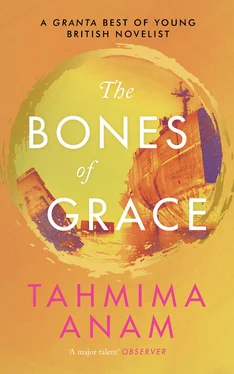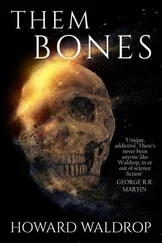Lately there had been a few stories in the papers about how Bangladesh was built on a major fault line. That the apartment buildings in the big cities were too close together, put up without any regard for safety, and even a tiny tremor would be catastrophic. If ever there was a time for an earthquake, this would be it. The house would slide down the hill and this conversation would end. The rest of the sandwich sat in my hand. ‘It was a mistake,’ I said, using my free hand to wipe my mouth. For a few minutes, there was only the sound of me sobbing, and the rustle of my sari as I shifted to find a tissue on the side table.
Dolly summoned Komola again. ‘Take the trolley away,’ she scolded. ‘Can’t you see she’s finished?’
When the tray was cleared, she turned to me again. ‘I’ve been trying to protect you all these years. Making you feel it didn’t matter where you came from. Treating you like you were my own daughter. But you have disappointed me. And I can only assume it’s your bad background.’ She dropped it in casually, like a cube of sugar into a warm mug of tea. I looked up to see if she regretted the words as she uttered them, but she looked at ease with herself as she always did.
I was emboldened by this revelation of fact and prejudice. ‘If it was so bad, why did you agree to the marriage?’
Dolly ran her hands up and down the armrest of her chair. ‘You’re not a mother, you wouldn’t understand.’
It would be easy to assume she had hated me all along, but I knew this was not the whole truth. There was loyalty in her acceptance of the match, a genuine regard for my parents, and not a small amount of affection for me. I had squandered all of this.
‘Anyway, what’s done is done. I don’t know if Rashid will forgive you. That is between you. But you will never be the same to me. And I’m no longer willing to protect you.’
I wasn’t sure what she meant; I could only assume she would speak openly and publicly about who I was, so that if word got out about what I had done, or if Rashid and I were to break up, she would have an easy explanation.
‘I had a servant girl,’ she continued. ‘She heard us talking about your parents — we talked about it all the time, the tests, the doctors. They tried so hard. This girl came to me and told me a girl in her village was — that she needed help. We went to Mymensingh, we met the girl. The husband had abandoned her. She had no money, nothing. We paid her twenty thousand.’
‘You bought me?’
‘Don’t be naive. The girl needed money.’ It was hard — impossible, really — to imagine myself at the centre of this drama. That money would have exchanged hands. And then, me, a salve for my mother’s wounds. Komola appeared at the periphery of my vision, switching on a lamp in a corner of the room. I heard the distant rumble of thunder. In a few minutes, I would hear water pounding the trees and the lawn. Dolly shifted; she was going to get up and leave me there in the dark room with my red face and the sandwich still in my palm. ‘And there was one more thing,’ she said, pointing her toe. ‘I haven’t wanted to mention it, but like I said, I don’t consider you mine any more, so you might as well know. The girl didn’t tell us at first, but when we got to the village, there were two babies.’
The breath stopped in my chest. ‘Twin girls,’ she said. ‘Everyone in the village was talking about it, two babies and not one of them a boy.’
‘That’s impossible,’ I said. Surely if I had been a twin, I would have known it. I would have felt an emptiness, like a phantom limb, throughout my life. There would have been the imprint of this womb-sister, a voice inside my voice. My loneliness would have multiplied; my loneliness would have been halved. Dolly was lying.
‘We wanted to take both, of course. But she refused. So stubborn. Insisted on keeping one of them. We argued but there was no persuading her. Idiot girl. What could we do? We couldn’t tear the child from her arms.’
‘Did you tell my mother?’
‘Of course we didn’t. She’d been through enough.’ Dolly turned away, dismissing me, and now it began to rain, dark sheets of water pouring off the guttering, and the sound, a hush, like a mother trying to quiet her baby. I smoothed the folds of my sari and got up, feeling myself crumble from within. I turned to leave. ‘Please can I go now?’ I whispered.
Dolly regarded me for a minute, looking me up and down with naked distaste. ‘Poor Baby Babu,’ she said. ‘Ruby was right.’ And then the door closed behind me.
I went upstairs and lay on the bed. I should pack a suitcase, I thought. Call the driver and ask to be taken to the airport. But I couldn’t move. I stared up at the track of lights on the ceiling. The blouse of my sari was tight under my arms and around my chest. I thought of the pair of Shakoor paintings that hung in the bedroom in Dhaka. Two similar-looking women, strong faces, big noses, bands of primary colour across the top and bottom edges of the frame. A parrot sat on the head of one, a flower adorned the hair of the other. Twins. I hardly allowed myself to think about what might have happened if my parents hadn’t adopted me. Of the life I might have had. Hunger and cold. Want and lack. The absence of comfort. But now not only was it possible to imagine this life, there was actually someone out there living it, someone who looked exactly like me, same curly hair and wide mouth and long, elegant fingers, fingers that may have never known the gentle weight of a pencil. I wondered, if I lay here, very still, without moving, if this new knowledge might disappear from my mind, in fact, history itself might be altered, so that all of this truth telling could be reversed. I might stay here until there was no longer a twin, no longer a woman who took money for one child so she could raise another, but time moved in only one direction, though I wished it were not so, wished it could be anything but so.
It rained and rained, and the sky grew darker until it was night, and still I lay there. After a long time I heard the door opening and footsteps approaching. A warm, dry hand was cupped over my forehead, and I saw the cufflink and smelled the familiar scent of leather and aftershave on his sleeve. Rashid.
‘I’m leaving,’ I said, pulling myself upright.
‘Don’t go,’ he whispered into the dark. He leaned over me, pressing my face into the collar of his shirt. My sari rustled as the fabric collapsed between us.
‘I’ve ruined everything.’
‘Stay with me. Stay and don’t leave my side.’
I was comforted. He held me tighter and I considered falling asleep in his arms. But I wondered how he could be so easily duped, that he could imagine me returning to him and continuing with our lives as if nothing had happened. Erasing you from our history. How naive he was, how foolish.
‘What time is it?’
‘Nine thirty. Are you hungry? I can have something sent up.’
‘I have a sister. Did you know that? A twin sister.’
He sighed. ‘This again.’
I sat up. ‘A sister, Rashid. There is a woman out there in the world who looks just like me. And your parents never told me.’
‘You know everyone was just thinking of you. What’s best for you.’
‘Your mother said I had a bad background.’
‘She’s upset.’
‘I should at least know for myself. How bad it really was.’
He released me. I went to the bathroom and splashed water on my face, and when I returned he was calling someone. ‘Here,’ he said, handing me the phone, ‘your father wants to talk to you.’
‘Putul,’ Baba said, ‘what’s going on? You don’t answer your phone.’
The tears came back, fresh and bitter. ‘Dolly’s angry. She hates me.’
Читать дальше












